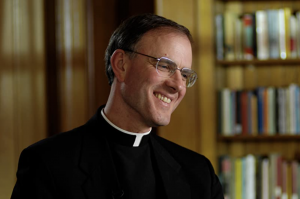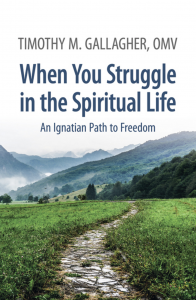In “When You Struggle in the Spiritual Life: An Ignatian Path to Freedom” (Crossroads Publishing, $14.95), Father Timothy Gallagher, OMV, addresses the everyday challenges faced by those seeking a deeper relationship with God.
Drawing from the spiritual wisdom of St. Ignatius of Loyola and from the second rule of his classic discernment of spirits, Father Gallagher breaks open the four ways in which the enemy tries to discourage people from moving more closely to God, and the five ways in which the good spirit is going to try to encourage persons on their journey.
Kris McGregor: St. Ignatius truly understands that the daily struggle in the spiritual life is real, doesn’t he?
Father Timothy Gallagher: Yes, he does!
We’re all well-aware that there are times of energy in the spiritual life when God feels close and prayer is alive, and we look forward to the new steps.
And then, for reasons we often don't understand, the bottom seems to drop out of that energy. It’s hard to even want to pray. And if I can say this reverently, maybe we don’t pray, or pray less, or not as well as we wish we did. The energy for those new steps and involvement in the parish and living our vocation more deeply — all of that seems to wane.
Because we don’t understand it, we don't really know how to respond to it. Most of the time we don’t even know how to talk about it until St. Ignatius gives us a vocabulary. But it’s very real, and it matters a lot in the spiritual life. St. Ignatius brings us clarity, and gives us a set of tools to know how to respond to it.

McGregor: All the rules in the discernment of spirits are essential gems. Why is this book primarily dedicated to the second rule?
Father Gallagher: Every one of the rules is useful, and so in whatever order you learn them, they’re going to be a blessing. But obviously there is a reason why St. Ignatius wrote them in the order that he did, and learning them with a certain systematic approach is going to be helpful.
He looks at the “good spirit” and the “enemy.” The “good spirit” is God, the Holy Spirit, the good angels, the rich work of grace in us, good influences around us in the world. And the “enemy” is Satan and his fallen angels, the wound of concupiscence, that weakness as a legacy of original sin, and all the harmful influences around us.
They’re both real, both important, and they both need to be understood in the spiritual life, but they are not equal parts. The enemy is of a higher order than we are, but still no more than a fallen creature. And the good spirit is the infinite eternal omnipotent, endlessly faithful, present, loving Savior and God.
This is a whole spirituality of hope. It is all about freedom. It’s about setting us free from these discouraging lies and tactics of the enemy.
The second rule speaks to the situation of anybody who seeks to grow in their relationship with God. A person who sincerely loves God, who is a person of faith, who wants to be faithful to God, who wants to live according to the teaching of Jesus, wants to be loving. And this person will encounter the ups and downs of the spiritual life.
McGregor: St. Ignatius’ teachings on the four tactics of the enemy says he will “bite, sadden and place obstacles,” but will also affect us by “disquieting with false reasons.” I think that is a really tricky one.
Father Gallagher: In this particular tactic of the enemy, the enemy is speaking to our thoughts. It’s about reasons that the enemy brings to discourage us.
Because the enemy, as Jesus says, is the liar and the father of lies, when the enemy brings reasons they are going to be false reasons. There’s not going to be truth in them, maybe a grain of truth, but twisted so much that it becomes a lie, or even just an outright lie.
The effective consequences of these false reasons that the enemy will propose is to trouble our hearts. When we find ourselves thinking in ways that are false, we may not see it immediately. This is why it is important to be aware and to understand what is troubling our hearts, to be aware of what may appear as involuntary thoughts, temptations, and attractions.
Realizing this as a tactic of the enemy, we can say, “Wait a minute.” That’s the awareness. “You know what, this isn’t right.” That’s the understanding. And then we know these thoughts are of the enemy and we say, “I’m not going to let this stop me.” That’s taking action to reject. I love that, because that’s freedom in the spiritual life.

McGregor: If the enemy has four tactics, God has five. He’s never out done! St. Ignatius says the good spirit will “give courage and strength, consolations, tears, inspirations and quiet, easing and taking away all obstacles.”
It’s really the power of grace and being able to receive that, to be aware of it, to understand it, and then allowing it to carry us, that’s key.
Father Gallagher: That's the bottom line in this whole thing. There are all sorts of nuances to this, but sometimes we can be very aware of the enemy and the discouragement, and not aware enough of the bigger part of the picture, and that’s the good spirit. We’re on the winning side in this. And so it really is a blessing to focus on the ways in which the good spirit is at work every day. So to be aware of that, to understand it for the action.
In this case, it’s, “Oh. …” That’s the awareness. “Oh, this is so helpful.” That’s the understanding. And then thanking the Lord, and opening our hearts to receive it. That’s to take action.
If you look at the two things — what God does in the spiritual life and how the enemy attempts to discourage us from that — both are important, both are real. But obviously what is primary, absolutely, is what God is doing. And so that’s always the most important thing in the spiritual life.
We know by experience that when we open our hearts to this loving, strengthening action of the good spirit, we grow so much. But having said that, it is also very liberating to be aware of and name and understand these four tactics of the enemy and firmly reject them, because that safeguards and opens up the path for the action of God in our lives.

